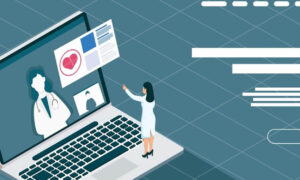Why Security Testing is Important for Healthcare Applications?
October 29, 2024
There are a range of reasons for healthcare applications becoming popular in India, including convenience, patient care, and operational efficiency, their range in handling sensitive personal and medical information would vary between EHR management to telemedicine platforms. This trend is, on the other hand, being followed by an upward spiral regarding data breaches, cyber-attacks, and other security vulnerabilities, which makes healthcare app security testing the only necessary workflow.

1. Protection of Patients’ Sensitive Information
Health sector applications store vast information on an individual and their health, like names, addresses, Social Security numbers, health history, insurance, and much more. This is one of the roles of security testing in healthcare. Attacks are therefore usually directed at these applications as hackers seek to take advantage of each vulnerability for stealing, manipulating, or selling data on the dark web.
Key Reasons for the Protection of Patient Data:
- PII or health records are some of the most valuable information to any cybercriminal.
- Stolen information might lead to identity fraud and loss of confidence.
- Breaches can also result in litigation involving healthcare organizations.
2. Adherence to Healthcare Regulations
There are many regulations that govern healthcare applications with respect to handling and protecting patient information. HIPAA in the United States, and GDPR in Europe, among others, require the highest level of sensitivity from health professionals towards the safety of sensitive data. Security testing ensures that healthcare applications adhere to all these regulations.
Key Compliance Regulations Include:
HIPAA – Health Insurance Portability and Accountability Act
GDPR – General Data Protection Regulation
HITECH – Health Information Technology that comes entitled with the Economic and Clinical Health Act
3. Prevent Cyber-Attacks and Data Breach
There exist many variants of cyber-attacks, including but not limited to phishing, ransomware, and malware, that are ever-evolving and may target healthcare applications with disastrous results. Choose a reliable Software Development Company for implementing checks and all. Ransomware attacks have been increasingly carried out against hospitals and healthcare providers; hackers encrypt patient records and then demand considerable sums for their decryption.
Key Cyber Threats to Healthcare Applications:
Ransomware attacks: Encryption of patient records, for which a ransom is demanded.
Phishing: Trying to obtain sensitive information by illicitly facilitating communication.
Malware: Deployment of malware to steal data by infiltrating health systems.
4. System Integrity and Availability
Applications in the healthcare industry are designed not only for storing sensitive information but also for supporting critical services in patient monitoring, medical diagnosis, and emergency care. A breach or failure of the system may turn fatal. Ensuring the integrity and availability of healthcare applications guarantees no disruption to patient care.
Importance of Maintaining System Integrity:
- Ensures data accuracy, completeness, and integrity.
- Prevents unauthorized changes and tampering in patient records.
- Ensures application availability during critical healthcare processes.
5. Enhancing Users Trust
Most healthcare applications are utilized by a wide range of stakeholders, including patients, healthcare professionals, and administrators. Enhancing application security can easily be done by testing security to ensure these apps can be trusted to handle their data safely and securely. Trust is a big factor in digital healthcare solutions, especially in sensitive areas.
Key Factors Affecting the Trust of Users:
- A secured platform builds better engagement and loyalty among users.
- When security is ensured, patients are more likely to embrace telemedicine and online health services.
- Health professionals rely on secure applications for patient care due to their dependability and accuracy.
6. Avoiding Financial and Reputational Damage
The financial ramifications of a major data breach or cyber-attack could be severe: high legal fees and fines, remediation costs, organizational reputation damage, loss of patients, loss of partners, and eventual loss of staff. After all, such financial and reputational risks can be protected by security testing, which finds respective vulnerabilities before they can be exploited.
Lacking Proper Security May Have the Following Possible Consequences:
- Loss of patients due to decreased trust.
- Legal liabilities because of data breaches or non-compliance.
- After a cyber-attack, you may need to recover ransom costs.
7. Safe Integration with Systems
Since healthcare applications usually need to integrate with multiple external systems, like medical devices, laboratory systems, and billing platforms, all these represent potential vulnerabilities if the process of securing is not taken seriously. Security testing means making these integrations secure to minimize the possibility of disclosures or cyber-attacks.
Importance of Integrated Secure System:
- This encrypted sensitive data during transmission between systems.
- Prevents unauthorized access to integrated systems.
- Ensuring properly seamless and secure communication between healthcare applications and external platforms.
Conclusion
Security healthcare application development is very important. It protects sensitive patient data, enables compliance with regulations, blocks cyber-attacks, and develops trust among users. Without comprehensive security testing, healthcare applications risk breaches and disruptions that could compromise patient safety and organizational integrity. With a focused emphasis on security testing, it will be easy for any healthcare provider to deliver secure, reliable, and fully compliant digital solutions that support both patient care and operational excellence.
Contact us at Aascent InfoSolutions if you are looking for security testing services.





Leave a Reply